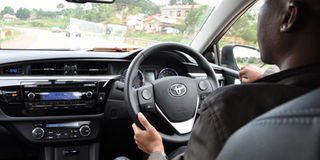A shaking steering could be sign of other problems

Knowing when the shaking occurs will help you diagnose the problem more effectively. PHOTO | RACHEL MABALA
The only source of noise you expect to hear while driving mostly comes from the environment within which you are driving. However, some of it may come from your car, especially from the tyres.
Poor alignment
Steven Abigaba pays attention to every sound that his Toyota Mark II Grand makes, and every light that appears on his dashboard. He believes that it is one of the ways he is able to detect any mechanical problems before they worsen.
However, when it came to the steering wheel early this year, his instincts got it wrong. It suddenly started shaking as he drove to Kampala from upcountry, but he did not pay much attention to it.
The next day when he drove the same car, the shaking seemed to have disappeared mysteriously, something he thought was normal.
“After three days, the shaking resumed but much stronger that it could at times cause my arms to shake. I drove for one more day but it become uncomfortable to bear so I called my mechanic. After carrying out a vehicle diagnosis, I was informed that my tyres were not well balanced, causing the steering wheel shakes,” Abigaba recalls.
Worn-out brake discs Hamza Massadda, a mechanic, says besides poor wheel alignment, old or worn out brake discs (brake rotors), could be the other source of steering wheel shakes, especially when braking.
In normal shapes, brake discs ought to be circular and smooth. Brake discs are part of your car braking system against which the brake pads rub or touch when you step on the accelerator pedal to stop or control the car.
“They (brake discs) get deformed depending on the way you brake. If you subject them to harsh braking, they will not only dissolve the brake pads very fast but they will be rough on the rotor and it will lead to steering wheel shakes in the long run,” Massadda explains.
Unbalanced wheels
Wheel balancing means balancing the weight of car tyres against the wheel system so that the two move evenly regardless of the speed you drive at.
“When some of your wheels are unbalanced, you will feel the shaking as you steer. The shaking will not only be felt through the steering wheel but also through the seats,” Massadda adds.
Damaged wheel axle
According to Eric Amadi, a mechanic, damaged wheel axles also cause steering wheel shakes. Wheels axles are parts of your car that turn around to allow turning of your wheels by turning or transferring engine power and torque from the transmission to the wheels. Like any other car parts, wheels axles also wear out with time.
Suspension issues
According to buyautoparts, an online portal, the suspension system of vehicles includes a complex structure of shocks, pistons, springs, and rods that connect the wheels to the rest of your car. Suspension contributes to how your vehicle handles and brakes, in addition to minimising bumps, noises, and vibrations within the cab.
The portal says a variety of suspension issues can arise over time, and while these issues may be difficult to pinpoint, they are generally easy to fix once discovered.
Some of the most common suspension issues that may lead to a shaking steering wheel are worn or corroded parts, loose connections, driveshaft imbalance, and old shocks.
“If you notice steering wheel shaking and think it is related to a suspension issue, pay attention to when the shaking occurs. It may increase when you speed up, maintain a particular speed, or at completely random times. Knowing when the shaking occurs will help you diagnose the problem more effectively,” the portal says.
The portal advises that doing a thorough investigation of your entire suspension system will help you find the cause of the problem.
Based on additional symptoms, such as rattling or grinding, you should be able to locate the source of the issue and repair it quickly.
Checking brake pads
Brake pads are designed to be replaceable, and it is accepted that replacing them periodically is simply part of the cost of operating a vehicle.
Brake pads thinning can often be observed simply by looking at them. There will be several other symptoms of thin brake pads such as a vibrating brake pedal or unusual sounds coming from your car when you apply the brakes. People have described these sounds as clicking, grinding, or screeching, and any of these sounds indicate a problem.



